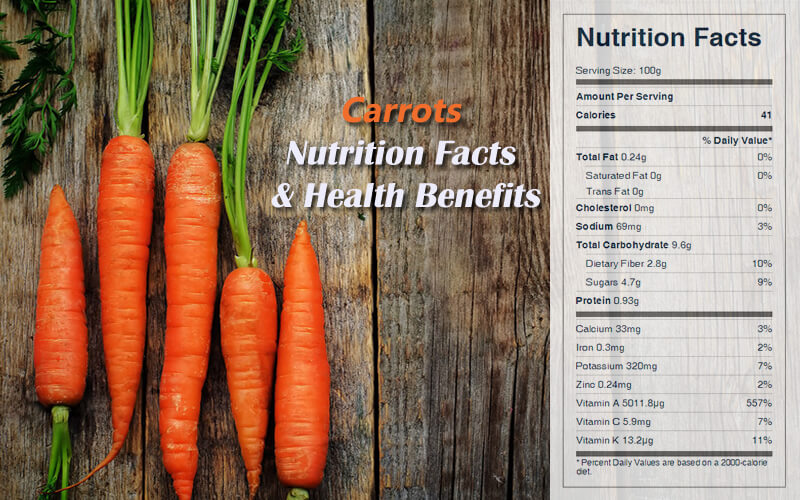Carrots Nutrition Facts & Health Benefits
The carrot is a root vegetable, typically orange in color, carrots are so rich in betacarotene that a single carrot supplies enough vitamin A for an entire day. Here are nutrition facts and health benefits of carrots.
Raw carrots are 88% water, 9% carbohydrates, 0.9% protein, 2.8% dietary fiber and 0.2% fat. Carrot dietary fiber comprises mostly cellulose, with smaller proportions of hemicellulose, lignin and starch. Free sugars in carrot include sucrose, glucose, and fructose.
Bright orange colour in carrot from β-carotene, and lesser amounts of α-carotene, γ-carotene, lutein, and zeaxanthin. The roots contain high quantities of alpha- and beta-carotene, and are a good source of vitamin A, vitamin K, and vitamin B6.

Carrot Nutrition Facts Label
Health Benefits of Carrots
Carrots are also near the top of the list of vegetables that protect us against cancer, and especially against lung cancer, a fact that is borne out in a number of population studies. A diet high in carotenes has been associated with significant decreases in the incidence of some cancers, including cancers of the bladder, cervix, prostate, colon, larynx, esophagus, and post-menopausal breast cancer.
Carotenoids are named after carrots, because of the enormous number of carotenoids found in this root vegetable, they play a significant role in their antioxidant benefits. The carotenoids concentrations are primarily b-carotene at 75 percent and then alpha-carotene, lutein and betacryptoxanthin, lycopene, and zeaxanthin. Dietary carotenoids, especially vitamin A, protect our DNA due to their antioxidant capacity and also help maintain the normal function of the immune system and mucosal membranes. Their antioxidant content is also useful for people with atherosclerosis.
Polyacetylenes are a group of phytochemicals found in carrots that are reported to have anticancer and anti-inflammatory actions. One study found that polyacetylenes used against cancer cells demonstrated a toxic effect. Falcarinol is the most bioactive polyacetylene in carrots. In addition, it has been found to be help with diabetes due to its ability to stimulate basal or insulin-dependent glucose absorption, and detoxify the body by reducing excess estrogen.
Raw carrots contain a special fiber, pectin, that binds to estrogen in the gut and removes excess estrogen with it. Estrogen is an important hormone in the body, but it needs to be detoxified just like any other toxin or medication; when it’s not eliminated and carried out, hormonal problems can persist. Eating a raw carrot a day could help reduce the level of estrogen in just three days, as well as lower inflammation and help with thyroid function, they have benefits in hormonal and thyroid balance. Raw carrots have also been found to lower serotonin and histamine in the body, resulting in less need for cortisol!
Raw carrot juice is equally valuable for jaundice. Eating carrots increases the levels of red blood cells, and studies have also shown that carrots protect against excess ultraviolet light or radiation, getting carotenes from food is far more effective than consuming supplements.
Plus, we commonly hear that eating carrots is good for the eyes. This is because the lutein found in yellow carrots is the only carotenoid that passes through the retinal barrier in the eye to allow for the powerful antioxidant to protect the cells of the eyes.
Health Tips
Carrots can be eaten in a variety of ways. Only 3 percent of the β-carotene in raw carrots is released during digestion: this can be improved to 39% by pulping, cooking and adding cooking oil.
Storage
Among orange carrots, the deeper the color, the more beta-carotene it contains. Carrots should be bright in color and firm. They should look fresh, not dry.
Because the carrots we eat are roots that, when still in the field, exist to provide moisture and nutrients to the tops, be sure to remove the greens before you store your carrots so that the nutrients are kept in the root portion.
Keep carrots in the coolest part of the refrigerator, wrapped in plastic. Carrots can be stored for several months in the refrigerator or over winter in a moist, cool place.
For long term storage, unwashed carrots can be placed in a bucket between layers of sand, mix of sand and wood shavings, or in soil.